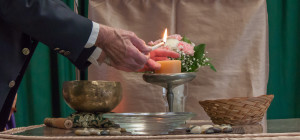
What is a Ritual? The prescribed order of a religious ceremony. A ceremonial act or performance of such acts. Another definition is: A ritual is a series of symbolic acts focused towards fulfilling a particular intention.
Why do we create ritual?
There are numerous reasons why we need ritual in our lives. Rituals help us accept change and to grow. Rituals mark great achievements and help us to grieve a loss. We live in challenging times when the world changes faster than ever before. Rituals help ground us, assist us in deepening our connections to our families and our communities. Rituals mark and acknowledge transformations throughout our lives.
When we are affected by transitions in our lives rituals help us return to a sense being whole again.
The minimum time required to integrate a life event is one year. Rituals aid us process life events and help us get balanced in a more holistic way.

Rituals are like the guy wires of a tent – providing stable points that ground us so the rest of the tent can reach to the sky.
German mystic Novalis says “The seat of the soul is where the outer and inner worlds meet.” Ritual is the bridge between those two worlds and provides a way for us to reconnect with that soul place.
The end result of ritual is balance and comfort, which then brings us back to equilibrium.
All rituals fall into these categories, while some are more than one: Beginnings, merging, cycles, endings and “healings”. A wedding could be included in all of the categories.
There is an art to creating meaning ritual –
Each ritual invites you to enter liminal space – outside of the bounds and constraints of time. Ceremonies encourage us to go beyond the parameters that define our perception of reality.
A ritual can be defined as a series of symbolic acts focused towards fulfilling a particular intention.
How many of us suffer from what philosopher Martin Heidegger called “forgetfulness of being”. When our energy is going to getting through the day, when we lose our connection to the rhythm of our lives.
Before we can begin to create meaningful ritual we need to return to a state of mindfulness of being. This is a place where we are the creative composer of our lives. Where we are aware and conscious.

Daily Rituals:
Rituals are appropriate anywhere as illustrated from the book “Orange is the new black” by Piper Kerman –“I settled into rituals which improved the quality of my existence immeasurably. The ritual of coffee-making and drinking was the first.”
We have hundreds of unconscious rituals that fill our day from our morning cup of coffee to going to the gym.
Ponder the things you do on a daily basis that you enjoy; your commute to work, your exercise, or your meals? Do we take the time to enjoy these moments or do we rush through them unconscious of the pleasure of warm sun on our face or the taste of delicious nourishing food.
I invite you to think of a task that isn’t your favorite and make it more of an enjoyable ritual. There is great potential for us to do a task with mindfulness which takes a chore and turns it into a ritual.
To help transition a task to a ritual we can involve the senses. When we bring an awareness to the sights, sounds, smells, feel and less often taste.
American mythologist Joseph Campbell said “a ritual can be defined as an enactment of a myth. By participating in a ritual you are experiencing a mythological life. It’s out of that participation that one can learn to live spiritually.” Campbell writes that the function of ritual is “to give form to the human life, not in the way of a mere surface arrangement, but in depth.”

For a ritual to go well there are some basic guidelines:
- Remember to breathe and speak slowly
- Once you have created the ritual try to speak it from the heart rather than reading it.
- Practice, practice, practice
Who are we to bless people or to create ceremonies?
In my work training Lay Chaplains many people have said to me that they don’t feel they have the “power” to bless someone else. I usually respond asking people to recall what they would say if I were to sneeze right now. Yes, they would say “Bless you”. I think as humans we have the ability and the power to bless. To bless can be defined as to praise or to honour.
Each of us can bless – we don’t need special training – each of us holds the spark of the divine or the spark of wisdom within us – if you prefer.
I also wish to speak to fear. I think there are a couple of fears – fear of creating something half-baked – or the fear of “do I have the authority to do this?” If you approach ritual with a clarity of purpose and with an open loving heart what you create will be perfect.